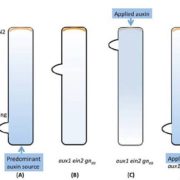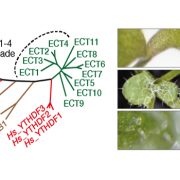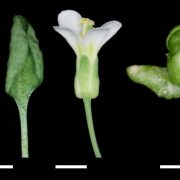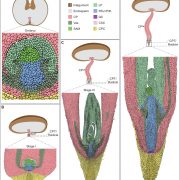CHIQUITA1 maintains the temporal transition between proliferation and differentiation in Arabidopsis (Development)
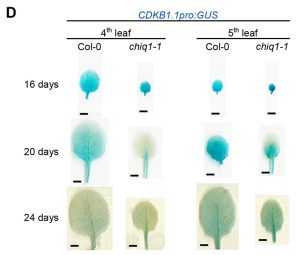 Organ size is imperative to biological function. In plants, newly-developing organs start out as a pool of meristematic cells, which set the number of cells in the organ through regulated iterations of cellular division; eventually, these cells transition out of the cell cycle and differentiate, during which they may undergo expansion/elongation. Ultimately, these two phases of development determine the parameters defining organ size: cell number and cell size. However, the molecular orchestrations through which plants control the transition from proliferation to differentiation are still mysterious. Here, Bossi et al. dissect the role of a gene previously identified as relevant to body size, CHIQUITA1 (CHIQ1), towards this transition. While fully-developed null mutants of CHIQUITA1 (chiq1-1) are dwarves, organs of chiq1-1 early in development were actually larger than those of the wild-type (WT). Leaf cell size analyses revealed this was due to younger chiq1-1 leaves having a higher proportion of differentiating, and thus expanding, cells than WT leaves of the same age. Molecular analysis of cell cycle markers show that chiq1-1 organs reduce their domains of proliferation earlier than WT organs. Measurements of cell cycle length confirm that cell cycle progression occurs normally in chiq1-1, suggesting that the cells of mutant organs exit proliferation prematurely. CHIQ1 was previously hypothesized to interact with CHIQ1-like (CHIQL) proteins. Organ and cell size analyses comparing WT, chiq1-1, and a quadruple null mutant of CHIQ1, CHIQL4, CHIQL5, and CHIQL6 indicate that CHIQ1 could be regulating proliferation exit via complexed activity with these CHIQL proteins. From this work, we attain greater insight into the genetic controls involved in plant organ development, and see the necessity of analyzing developmental phenotypes at the cellular level in addition to the organ level. (Summary by Benjamin Jin) Development 10.1242/dev.200565
Organ size is imperative to biological function. In plants, newly-developing organs start out as a pool of meristematic cells, which set the number of cells in the organ through regulated iterations of cellular division; eventually, these cells transition out of the cell cycle and differentiate, during which they may undergo expansion/elongation. Ultimately, these two phases of development determine the parameters defining organ size: cell number and cell size. However, the molecular orchestrations through which plants control the transition from proliferation to differentiation are still mysterious. Here, Bossi et al. dissect the role of a gene previously identified as relevant to body size, CHIQUITA1 (CHIQ1), towards this transition. While fully-developed null mutants of CHIQUITA1 (chiq1-1) are dwarves, organs of chiq1-1 early in development were actually larger than those of the wild-type (WT). Leaf cell size analyses revealed this was due to younger chiq1-1 leaves having a higher proportion of differentiating, and thus expanding, cells than WT leaves of the same age. Molecular analysis of cell cycle markers show that chiq1-1 organs reduce their domains of proliferation earlier than WT organs. Measurements of cell cycle length confirm that cell cycle progression occurs normally in chiq1-1, suggesting that the cells of mutant organs exit proliferation prematurely. CHIQ1 was previously hypothesized to interact with CHIQ1-like (CHIQL) proteins. Organ and cell size analyses comparing WT, chiq1-1, and a quadruple null mutant of CHIQ1, CHIQL4, CHIQL5, and CHIQL6 indicate that CHIQ1 could be regulating proliferation exit via complexed activity with these CHIQL proteins. From this work, we attain greater insight into the genetic controls involved in plant organ development, and see the necessity of analyzing developmental phenotypes at the cellular level in addition to the organ level. (Summary by Benjamin Jin) Development 10.1242/dev.200565


